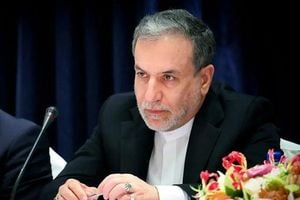Muslims across France are preparing for the holy month of Ramadan, which is set to commence on Saturday, March 1, 2025. This announcement was officially confirmed by the Conseil français du culte musulman (CFCM), making this Ramadan not only spiritually significant but also culturally impactful for the estimated 3.5 to 5 million Muslims living in France.
Ramadan is traditionally marked by fasting from dawn until sunset, and its exact dates are often determined by lunar observations. The lead-up to Ramadan will begin with the 'Nuit du doute' or 'Night of Doubt' happening the evening of February 28. During this time, religious authorities will be observing the new crescent moon, which signals the start of the fasting period. According to the CFCM, "Le mois de Ramadan 1446 H débutera dès le samedi 1er mars 2025."
The Grande Mosquée de Paris plays a pivotal role during this time, hosting the religious commission responsible for officially announcing the beginning of Ramadan. This commission will meet on the 'Nuit du doute' to make determinations based on both visual observations and astronomical calculations. An announcement from the Grande Mosquée articulated, "La commission religieuse chargée de déterminer... se réunira à la Grande Mosquée de Paris," reiterates the importance of unity among the Muslim community as they collectively prepare for the month.
During Ramadan, Muslims engage deeply with their faith, with fasting serving as one of the five pillars of Islam. The fast lasts from dawn until sunset, during which time practitioners abstain from food, drink, and intimate relationships. This holy month is not merely marked by abstinence; rather, it is steeped in spirituality, devotion, and charity. According to reports, "Durant cette période, ils jeûnent entre l'aube et le coucher du soleil pour commémorer la révélation du Coran."
Activities are often organized within communities and mosques, encompassing collective prayers and communal meals. One of the traditions is the pre-dawn meal known as 'Suhoor,' which takes place before the day’s fast begins, and the evening meal 'Iftar,' which breaks the fast at sunset. These gatherings are not only spiritually meaningful but also serve to strengthen community ties.
While Ramadan is predominantly seen through the lens of religious observance, it also embodies cultural significance. It is seen as an opportunity for personal reflection, community gathering, and social responsibility. Muslims are encouraged to engage with charitable acts during this month, providing for those less fortunate, and initiating food drives or community meals. The cultural aspect of Ramadan can be seen as being equally as significant as its religious obligations, as communities come together to partake in these traditions.
The CFCM confirms, "La Nuit du doute se tiendra le vendredi 28 février," emphasizing the necessity of observing the moon to finalize Ramadan’s start. This practice ensures adherence to Islamic tradition and promotes coherence within the community.
Post-Ramadan, followers will celebrate Aïd el-Fitr, which is scheduled to commence on March 30, 2025. This festive occasion marks the end of fasting and is observed with communal prayers, meals, and celebrations among family and friends. The relationship between Ramadan and Aïd el-Fitr highlights the continuity of tradition, with Aïd el-Fitr occurring directly after the last day of Ramadan. Such traditions form the bedrock of Muslim heritage, connecting generations through shared practices and beliefs.
The year 2025 marks another unique Ramadan observance, as the Islamic lunar calendar causes the dates to shift each year—usually by about ten to twelve days earlier each Gregorian year. This continuous change roots back to the reliance on lunar cycles, which means the experience of Ramadan is ever-evolving. This progression aims to deepen personal faith dynamics within the community, reinforcing not just faith practices but forging enduring cultural legacies.
For Muslims practicing Ramadan in contemporary France, the experience continues to adapt to modern life. Many now engage with technology, finding resources and community through social media and mobile applications. These innovations not only provide logistical assistance, such as prayer times and Iftar notifications but also reinforce community connections by sharing experiences, recipes, and reflections on spirituality through platforms available to the masses.
Despite the challenges posed by modern schedules and urban environments, French Muslims remain committed to their observance of Ramadan, creatively balancing daily responsibilities with their faith. This adaptability showcases the resilience of Islamic traditions, deeply planted within the heart of French society, where millions will soon partake once more in this sacred and communal experience.



